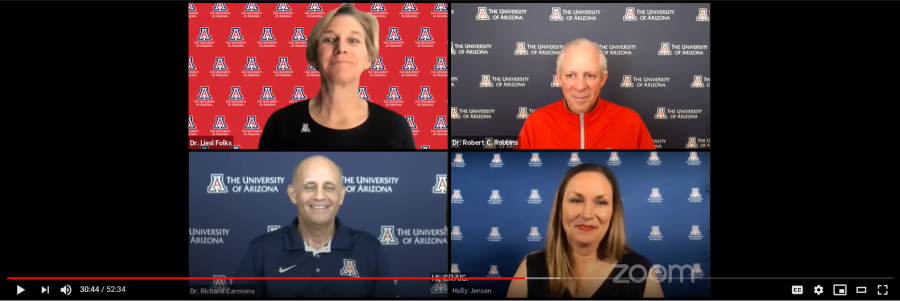The University of Arizona’s COVID-19 Reentry Task Force met Monday morning to discuss the continued measures it is taking to mitigate the transmission of COVID-19 in and around campus.
RELATED: Trump Comes to Tucson
UA President Dr. Robert C. Robbins began by announcing that eligible classes of up to 50 students may begin in-person instruction next week.
“This week we will continue in-person instruction for classes of 30 or fewer students,” the president said. “Next week, the week of October 26, classes of up to 50 students that were previously identified as in-person or flex in-person will have the option of beginning face-to-face on-campus instruction – that is, if public health conditions continue to permit. This is still part of our stage two reentry strategy.”
Robbins continued by sharing some data points on COVID-19 testing and transmission which he suggests are cause for optimism.
“We continue to see encouraging signs the past 10 days,” he said. “From October 8 until October 17, we’ve administered 6,867 tests with 44 positives identified. That’s a positivity rate of 0.6 [percent]. Additionally, the most recent day of wastewater-based epidemiology tests have shown zero positives across all of our locations, meaning no virus detected in these discrete geographic areas. This is contributing to an encouraging turnover the past several weeks for Pima county, including the 85719 zip code, which contains the university.”
Robbins added that students should schedule an appointment to get tested during the pre-holiday testing blitz, as walk-ins will be difficult to accommodate due to the great volume of individuals being tested during that time frame.
“Because of anticipated volume, these tests will be conducted by appointment only, rather than with the walk-in option as we have now,” Robbins said. “This testing blitz will begin on November 6. Students are being strongly encouraged to schedule an appointment for a test if they plan to leave their student residence and have not received a PCR positive test, antigen or antibody tests in the past 90 days.”
Students are also strongly encouraged to “complete the semester remotely after visiting family friends or loved ones outside the Tucson area.”
“Our primary goal is to minimize the impact of student travel on community spread of COVID-19,” Robbins said.
RELATED: Struggling to be seen: UA community reactions to recent Obergefell v. Hodges statement
Robbins then invited Provost Liesl Folks to talk about some of the measures that the university has taken to reduce the transmission of COVID-19, such as cancelling spring break.
“We have had to take a close look at our calendar,” Folks said. “And of course it’s a traumatic step to say we’re not going to have spring break next year, but it’s a really important step. The CDC is unambiguous about the fact that travel is one of the core ways that we spread the virus around the country, and we need to do our part as a community, as Wildcats, to reduce travel. By taking spring break, instead taking those days and using them as reading days throughout the semester, it is a way for us to reduce the incentives to travel for our faculty for our staff and our students, and in doing so make our community that much safer.”
As previously announced, the five consecutive days that normally constitute spring break will be broken up and spread out throughout the semester, being classified as “reading days.”
Folks also clarified that the start date for the spring semester will remain as planned.
“We have not changed the start date or the end date of our semester, so that remains unchanged,” Folks said. “All of your plans for coming back to campus at the beginning of the spring don’t need to be modified. We’re still starting the new semester on the thirteenth of January.”
Folks handed off the briefing to Task Force Director Dr. Richard Carmona, who prefaced his presentation of COVID-19 data from the past week by pointing out that despite criticism of many of the university’s decisions, it has been very transparent in sharing the data it uses in its decision-making process.
“We are in this airplane at 30,000 feet flying and learning how to fly it at the same time, because up until seven, eight months ago nobody had ever heard of COVID, so we are writing the playbook as we move forward,” Carmona said. “A lot of what we’ve done has become best practices that others around the country and the world have been adopting, as it relates to how to deal with a pandemic.”
He noted that cases in Pima county are very low, especially relative to last month, but he also reemphasized the University’s commitment to seeing the pandemic out.
“We are not going to be satisfied until we stop all transmissibility,” Carmona said.
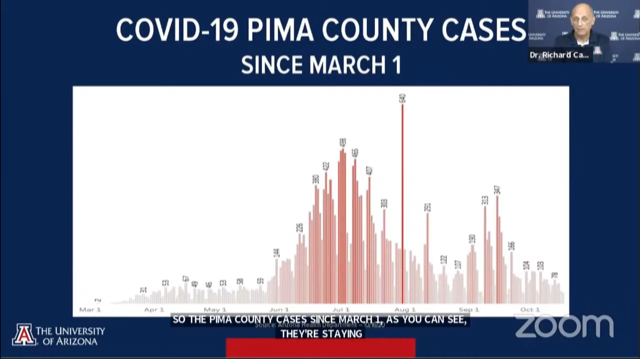
The Rt, or rate of transmissibility, for the state of Arizona has increased to 1.12, which Carmona said is not ideal.
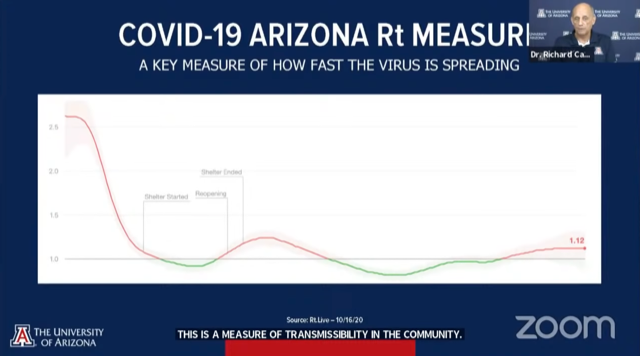
University CART was deployed 15 times within the past week to gatherings of more than 20 individuals and in violation of proper public health precautions.
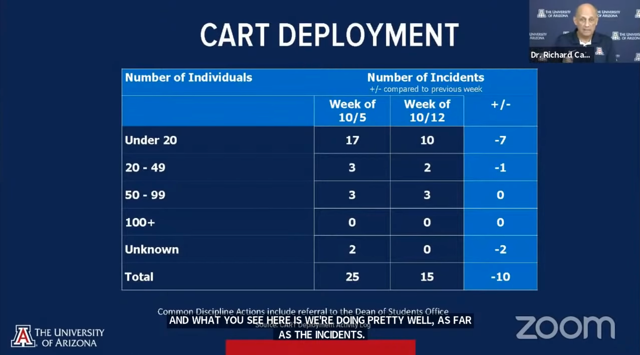
In the 10 days prior to the briefing (Oct. 8 to Oct. 17), 44 positives came out of 6,867 tests, for a positivity rate of 0.6%.
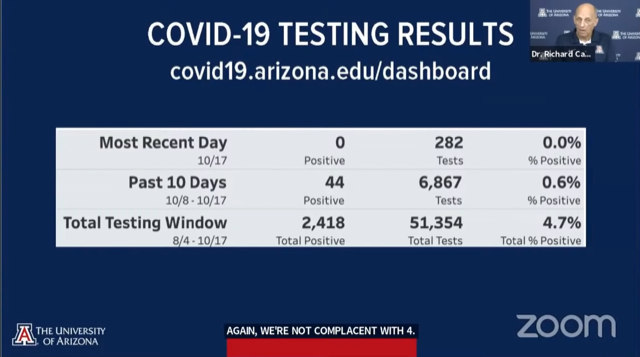
The university’s COVID-19 Reentry Task-Force will reconvene next Monday for its next briefing.
Follow Kristijan Barnjak on Twitter



